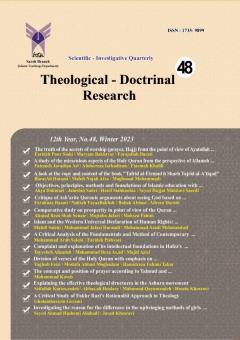Comparative study on prosperity in point of view of the Quran and philosophy: a study on some concepts and approaches
Subject Areas : Islamic theology
ahmadreza shahsanei
1
![]() ,
Mojtaba Jafari Eskavandi
2
,
Mohsenn Fahim
3
,
Mojtaba Jafari Eskavandi
2
,
Mohsenn Fahim
3
1 -
2 -
3 -
Keywords:
Abstract :
In the process of conflict between the forces of good and evil in human beings, sometimes the low inclinations prevail over the higher tendencies and the intellect and nature of man, and man, with sin, submits to the bondage of the descending powers of the soul. Accordingly, the main issue of the present study is the question of happiness. And we are looking for the answer to this question, what is the solution of the Holy Quran to get rid of this humiliation and how to achieve happiness? Therefore, the purpose of this article is the semantics of happiness in the Holy Quran; But since the approach of philosophy to the question of happiness is also considered in the present research; Therefore, the next goal is the semantics and method of achieving happiness in the philosophical system by focusing on Mulla Sadra's views. The findings of the present study, which is based on descriptive and analytical methods, show that the two words "Fawz" and "Fallah" are semantic equivalents of the word happiness in the Holy Quran. Happiness is valuable in its own way from the perspective of the Qur'an and philosophy. In the field of methods of achieving happiness, the Holy Qur'an has introduced two categories of doctrinal and practical factors, while in the philosophical system, mainly the method of self-cultivation has been emphasized. This article is not comprehensive and each of them has examined one of the characteristics. It should be noted that this article is taken from the author's doctoral dissertation.
ابن درید، محمد بن حسن (بی¬تا). جمهره اللغه، بیروت: دارالعلم الملایین، ج 3.
ابن فارس، احمد بن فارس (1422). معجم مقاییس اللغه، قم: مکتب الاعلامیه الاسلامی، ج6.
ابن عربی، محی الدین (1405). الفتوحات المکیۀ، قاهره: الهیئۀ المصریۀ العامۀ للکتاب، ج 1.
ابن منظور، محمد ابن مکرم (بی¬تا). لسان العرب، بیروت، دار بیروت، کتابخانه دیجیتالی، شماره 7322.
امامی، محمدجعفر (1387). نهجالبلاغه، قم: انتشارات امام علی بن ابی طالب.
امین اصفهانی، نصرت (1353). مخزن العرفان در تفسیر قرآن، بی¬جا: نشر ثقفی، ج 5.
ایزدی، محسن (1396). «تأملاتی در آثار ملاصدرا درباره سعادت قصوی (با رویکرد قرآنی)»، مجله انسان¬پژوهی دینی، سال 14، شماره 38، 104-85.
چوبینه، سجاد (1377). حکمت نظری و عملی در شاهنامه فردوسی، شیراز: نشر نوید.
راغب اصفهانی، حسین بن محمد (بی¬تا). مفردات، بیروت: دارالقلم.
شیرازی، محمدابراهیم (1380). مبدأ و معاد، قم: دفتر تبلیغات اسلامی، ج 1، 7، 9.
شیرازی، محمدابراهیم (1419). الحکمه المتعالیه فی الاسفار العقلیه الاربعه، بیروت: دار احیا التراث العربی، ج 1، 2، 3، 6، 8، 9.
شیرازی، محمدابراهیم (1981). المظاهر الالهیه في اسرار العلـوم الکمالیـه، تهران: بنياد حكمت صدرا، ج 1.
طباطبایی، محمد حسین (1374). تفسیر المیزان، قم: جامعه مدرسین ، ج 6.
طباطبایی، محمدحسین (1430). تفسیر المیزان، بیروت: دار احیاء التراث العربی.
طبرسی، فضل بن حسن (1372). ، مجمع¬البیان، تهران: نشر ناصر خسرو، ج 7، 10.
طریحی، فخرالدین بن محمد (1375). مجمع البحرین، تهران: نشر مرتضوی.
طیب، سید عبدلحسین (1378). أطیب البیان فی تفسیرالقرآن، تهران: نشر اسلام، ج 13.
عسگری، حسن بن عبدالله (بی¬تا). الفروق فی اللغه، بیروت: دارالافاق الحدیده.
غزالی، ابوحامد (1389). کیمیای سعادت، نسخه الکترونیکی.
فارابی، ابونصر (1421). جمع بین رایی الحکیمین، بیروت: دار و مکتبه الهلال.
فخر رازی، محمد بن عمر (1420). التفسیر الکبیر، بیروت: دارإحياءالتراث العربي، ج 14.
فراهیدی، خلیل ابن احمد (1383). کتاب العین، قم: نشر اسوه، ج 5.
قطب، سید ابراهیم (1425). فی ظلال القرآن، بیروت: دارالشروق، ج 3.
محامد، علی (1380). «سعادت و شقاوت از دیدگاه فلسفه و دین»، مجله پژوهشهای فلسفی و کلامی، شماره 7 و 8، 140-121.
مدرسی، محمد تقی (1419). من هدی القرآن، تهران: نشر دار محبی الحسین، ج 18.
مـصطفوی، حـسن (1430). التـحقیق فی کلمات القـرآن الکـریم، ییروت: دارالکتب العلمیه، ج 9.
ملکوتی نیا، علی و پسندیده، عباس (1392). «بازشناسی مفهوم فلاح در قرآن و حدیث»، فصلنامه علوم و قرآن و حدیث، شماره 1.
نجار، محمدعلی؛ محمدهارون، عبدالسلام و ازهری، محمد ابن احمد (1382). تهذیب اللغه، تهران: نشر صادق.


